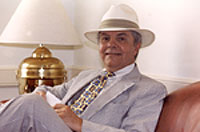 This summer when Planned Giving Director Jack McKee was visiting Bill Horner '39 at his home in Maine, he was offered a large volume of business letters written by school benefactor James W. Ellsworth during the 1880's. The volume itself is comprised of several hundred carbon type copies of letters and notes to family members, companies, and business associates. It has been added to the Ellsworth Collection in WRA Archives, but the story of its return is fascinating.
This summer when Planned Giving Director Jack McKee was visiting Bill Horner '39 at his home in Maine, he was offered a large volume of business letters written by school benefactor James W. Ellsworth during the 1880's. The volume itself is comprised of several hundred carbon type copies of letters and notes to family members, companies, and business associates. It has been added to the Ellsworth Collection in WRA Archives, but the story of its return is fascinating.It seems that when Bill Horner was at WRA, most students were required to
 spend part of one day a week working at Evamere Farm directly across Aurora Street from where Hudson Street intersects. This was the location of Ellsworth's farm of several hundred acres that he left to the school upon his death in 1925. The school operated a "farm program" through the 1940's, and finally sold off the acreage between 1951 and 1959. One spring day in 1936 Bill Horner and some of his classmates were at liberty in one of the barns when they discovered a bin full of old business volumes. Bill decided to take one home, and for over 70 years he kept this souvenir from Evamere Farm. He finally decided to "own up" to what he had snitched from the barn, and return it to WRA. He had inscribed on its cover the date he found it: April 12, 1936.
spend part of one day a week working at Evamere Farm directly across Aurora Street from where Hudson Street intersects. This was the location of Ellsworth's farm of several hundred acres that he left to the school upon his death in 1925. The school operated a "farm program" through the 1940's, and finally sold off the acreage between 1951 and 1959. One spring day in 1936 Bill Horner and some of his classmates were at liberty in one of the barns when they discovered a bin full of old business volumes. Bill decided to take one home, and for over 70 years he kept this souvenir from Evamere Farm. He finally decided to "own up" to what he had snitched from the barn, and return it to WRA. He had inscribed on its cover the date he found it: April 12, 1936.Someday a researcher may want to carefully look at each of the 300 or more letters in this book in order to gain some understanding of how Ellsworth built his business empire when he was still
 in his 30's. One window into that world of the Gilded Age is a series of letters regarding a business initiative in Wakeeney, Kansas in the western part of that state. I have subsequently learned that this was when Wakeeney, the "queen city of the High Plains" was just opening up to settlement and the building of the railroad, and by 1879 Ellsworth's younger brother, Frank, had gone there to be an agent for their Chicago-based coal business. For some reason, their father, Edgar Birge Ellsworth, who had lived all his life in Hudson, decided to go out to Kansas to visit his son in 1883 and died there. His body was shipped back to Hudson for burial. All this from a long-lost volume of letters that had been discarded in a barn all those years ago. We are pleased that Bill Horner has donated this priceless piece of our history.
in his 30's. One window into that world of the Gilded Age is a series of letters regarding a business initiative in Wakeeney, Kansas in the western part of that state. I have subsequently learned that this was when Wakeeney, the "queen city of the High Plains" was just opening up to settlement and the building of the railroad, and by 1879 Ellsworth's younger brother, Frank, had gone there to be an agent for their Chicago-based coal business. For some reason, their father, Edgar Birge Ellsworth, who had lived all his life in Hudson, decided to go out to Kansas to visit his son in 1883 and died there. His body was shipped back to Hudson for burial. All this from a long-lost volume of letters that had been discarded in a barn all those years ago. We are pleased that Bill Horner has donated this priceless piece of our history.
